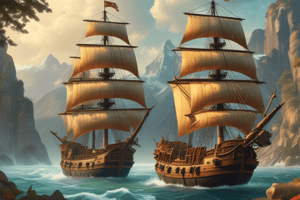Podcast
Questions and Answers
Which countries led the Age of Exploration?
Which countries led the Age of Exploration?
- Portugal
- Spain
- England
- All of the above (correct)
What were the main motivations behind the Age of Exploration?
What were the main motivations behind the Age of Exploration?
Desire for inexpensive spices, gold, wealth, and to spread Christianity.
The Age of Exploration occurred between 1450 and 1600.
The Age of Exploration occurred between 1450 and 1600.
True (A)
What major technological advancements facilitated the voyages during the Age of Exploration?
What major technological advancements facilitated the voyages during the Age of Exploration?
What impact did the Age of Exploration have?
What impact did the Age of Exploration have?
Who was the Portuguese sailor that led the expedition proving the earth was round?
Who was the Portuguese sailor that led the expedition proving the earth was round?
King Manuel I was significant in the Age of Exploration for his role in ______.
King Manuel I was significant in the Age of Exploration for his role in ______.
What did Magellan's expedition begin in the Philippines?
What did Magellan's expedition begin in the Philippines?
Flashcards are hidden until you start studying
Study Notes
The Age of Exploration
- Occurred between 1450 and 1600, marked by European exploration of Africa, Asia, and the Americas.
- Motivated by desires for inexpensive spices, gold, wealth, and the spread of Christianity.
- Portugal was a pioneer in exploration, significantly influenced by Prince Henry the Navigator who established a navigation school.
- Major powers such as Spain, England, and the Netherlands followed Portugal in exploration efforts.
- Advances in cartography and shipbuilding (caravel) contributed to successful voyages.
- Navigational tools such as the compass and astrolabe enhanced exploration capabilities.
Impact of the Age of Exploration
- Initiated an era of globalization, integrating different cultures and economies.
- Led to colonialism as European powers established overseas empires.
- Encouraged the spread of cultures and ideologies among different nations and peoples.
- Resulted in the discovery and introduction of new species to various parts of the world.
- Fostered a spirit of competition between nations as they sought new territories and resources.
Significance of Magellan’s Expedition
- Led by Portuguese sailor Ferdinand Magellan under the patronage of King Manuel I and King Charles I.
- The expedition began on September 20, 1519, with 5 ships and a crew of 250-270 men.
- Magellan's journey paved the way for Spanish colonization of the Philippines and marked the beginning of Christianization in the region.
- His expedition was crucial in demonstrating that the Earth is round, contributing to the understanding of global geography.
Studying That Suits You
Use AI to generate personalized quizzes and flashcards to suit your learning preferences.




